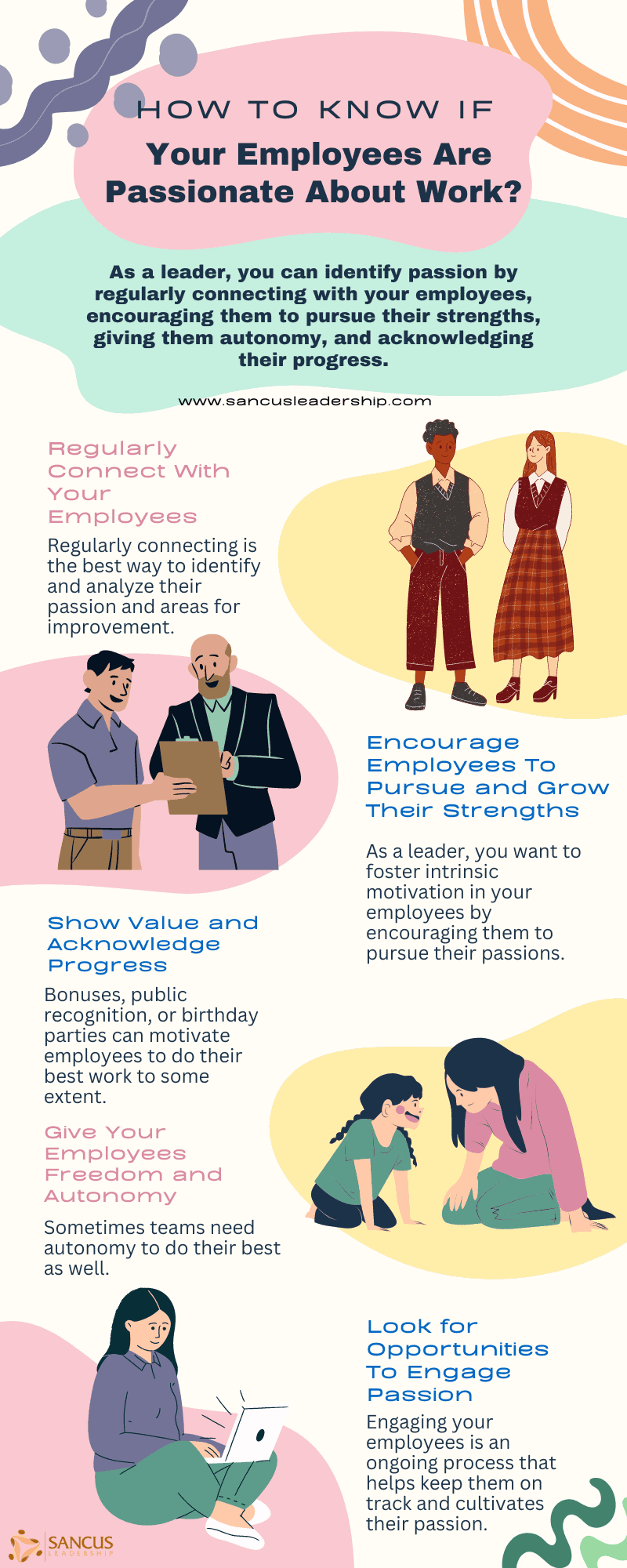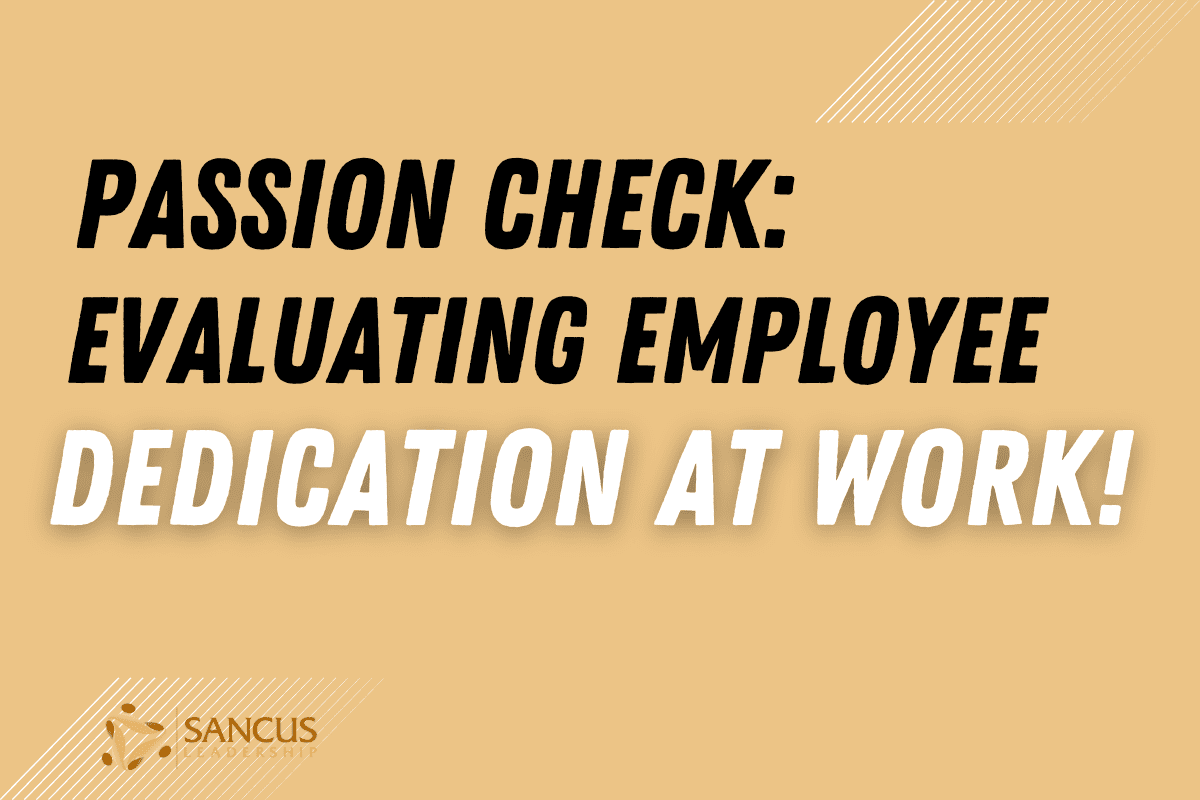All the low-performing teams I have observed have one thing in common; the leader thinks they are leading a passionate team. Passion goes hand in hand with engagement and impacts performance, progress, and creativity in the workplace. When leading, it’s essential to know if your employees are passionate and ways to engage them to their best selves. You want to know if your employees are passionate and signs that engagement needs to be added.
As a leader, you can identify passion by regularly connecting with your employees, encouraging them to pursue their strengths, giving them autonomy, and acknowledging their progress. As an ongoing process, you can also look for ways to engage employees and monitor their enthusiasm for work.
You can know how passionate your employees are through regular communication and observation. Read on to learn steps you can take to engage your employees and signs to look out for when you feel like passion is limited in your workforce.
| Main Points | Description |
| Regularly Connect With Your Employees | Building a positive and passionate work environment by regularly connecting with employees, identifying their passions, areas of improvement, and potential signs of missing passion. |
| Encourage Employees to Pursue and Grow Their Strengths | Fostering intrinsic motivation in employees by encouraging them to pursue their passions and work on tasks they excel at, pairing individuals with complementary strengths. |
| Show Value and Acknowledge Progress | Using external motivators like bonuses, public recognition, or birthday parties to foster engagement, identifying objective metrics to evaluate progress, and highlighting worker’s increased performance. |
| Give Your Employees Freedom and Autonomy | Striking a balance between managing employees when necessary and giving them the freedom to work autonomously, boosting creativity, confidence, and productivity. |
| Look for Opportunities To Engage Passion | Continuously engaging employees, nurturing and incubating passion, acknowledging and rewarding employees’ excitement, motivation, and creativity. |
1. Regularly Connect With Your Employees

Connection is the first step to promoting a positive and passionate work environment, as it gives you a starting point and lets employees know that you care about their well-being.
Regularly connecting with your employees is the best way to identify and analyze their passion, areas for improvement, and potential signs that passion is missing.
Potential signs that passion is missing from your workforce include:
- Disengagement. Employees engage in tasks above what is asked of them when they’re passionate. Only doing exactly what is necessary indicates disinterest or lack of passion.
- Complaints. Complaints from employees are, of course, signs that they are dissatisfied and perfect opportunities to discuss their grievances one-on-one.
- Absenteeism. Life happens, and occasional tardiness is normal. However, consistent absenteeism or tardiness indicates a frustrated or disinterested employee.
- Lack of Productivity: Your employees’ work performance is a general indicator of their enthusiasm for work.
Having an open-door policy in addition to one-on-one and team meetings can help employees express their concerns.
Team meetings are perfect for discussing workplace issues such as management issues or lack of supplies. An open-door policy and one-on-one sessions are more suitable for addressing employees’ problems.
2. Encourage Employees to Pursue and Grow Their Strengths

There are many motivations to do a job, some better than others. In general, external motivators such as reward or punishment are less effective than intrinsic motivators such as passion.
As a leader, you want to foster intrinsic motivation in your employees by encouraging them to pursue their passions.
As a leader, you want to foster intrinsic motivation in your employees by encouraging them to pursue their passions.
Every employee is different and enjoys different types of projects and tasks. Employees working on tasks they excel at and who foster their natural talents will be more passionate in the workplace than when doing jobs they dislike.
To improve the synergy of this method, you can pair individuals with complementary strengths who balance each others’ weaknesses and love what they do.
If you need help determining where your employees’ strengths lie, you can conduct one-on-one meetings to assess their assets.
Additionally, you can look out for these signs that your employee is passionate about what they do:
- Asking questions beyond their specific roles. Passionate employees have a natural want to learn more.
- Willing to stay extra hours. Passionate employees tend to lose track of time, be careful not to use your team, pay them overtime, and make sure they get enough rest so they can be healthy and work for the team for many years to come.
- Creative and Innovative. Passionate employees come to you with strange and odd ideas; this is exactly what you want; you need to handle the thousand stupid ideas to get to that one game-changing one.
3. Show Value and Acknowledge Progress

While intrinsic motivation is the core of a passionate employee, external motivators can sometimes improve and foster workplace engagement. Bonuses, public recognition, or birthday parties can motivate employees to do their best work to some extent.
The key here is to identify objective metrics you can easily observe and evaluate. These metrics can be included in an overall performance evaluation demonstrating progress and highlighting successes.
Possible metrics to observe include timeliness, the quality/quantity of work, and direct knowledge of their job. You can also use performance metrics to determine if passion is failing in the workplace.
You can highlight workers with increased performance through public awards or recognition. These economic or social boons show you value your workforce and appreciate their efforts.
Additionally, you can acknowledge growth by providing educational and training courses for some employees that you plan to promote and give more responsibility.
These courses improve their capabilities and give them a solid career trajectory within your company.
4. Give Your Employees Freedom and Autonomy

Giving your employees autonomy is a powerful way to demonstrate that you trust and appreciate your employee’s work. While essential managing is good, micromanaging will demoralize and decrease passion.
The trick is to strike a balance by only correcting or managing your employees when necessary and giving them freedom most of the time. Employees who have autonomy are more creative, have more confidence, and generally work faster than those who feel constrained within their tasks.
Autonomous employees are more creative, have more confidence, and generally work faster than those who feel constrained within their tasks.
Sometimes teams need autonomy to do their best as well. When teams lack passion, they take longer to complete tasks, disregard instructions, and don’t cooperate. Giving freedom to groups that feel too hampered can help boost their productivity.
5. Look for Opportunities To Engage Passion

The final step to determine if your employees are passionate about work is to look for ways to engage them when opportunities arise.
Engaging your employees is an ongoing process that helps keep them on track and cultivates their passion.
Passion isn’t something people are born with and can’t be given or taken away. Passion must be nurtured and incubated throughout an individual’s career or life.
Passion isn’t something people are born with and can’t be given or taken away. Passion must be nurtured and incubated throughout an individual’s career or life.
As a leader, you are not only sparking passion in your employees but also maintaining it and helping them grow so they can be the best team members possible.
Passionate employees are engaged and excited about new ideas or projects. These individuals will ask lots of questions and propose innovative ideas to explore.
When employees are excited, motivated, or creative in their work, acknowledge them with a reward, promotion, or extra responsibilities they will be happy to take on.

Final Thoughts
Workplace leaders have many responsibilities, and one of the most essential is maintaining passion among their employees.
Passionate employees are more motivated, creative, and engaged in their work. Individuals lacking passion are absent, frustrated, and have poor work performance.
You can determine how passionate your employees are by regularly communicating with them, encouraging them to pursue their strengths, acknowledging progress, giving them freedom, and engaging them throughout their careers.
Generally, the best way to promote passion is by allowing individuals to feel heard and respected while nurturing their intrinsic motivation.
Here’s a quick video of Simon Sinek sharing his thoughts and perspective on creating a trusting environment for the people you work with, where they feel involved, respected, and appreciated, which results in them enjoying and loving their job.



